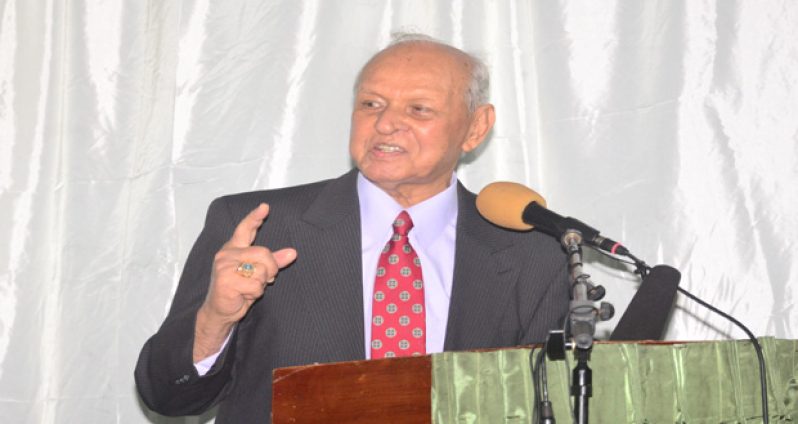CHAIRMAN of the Board of Directors, Dr Yesu Persaud on Saturday at the opening of Demerara Bank Limited (DBL) called for an improvement in performance so that Guyana can realise its true potential and become respected globally. With his experience in the world of business as well as his travels, Dr Persaud said Guyana takes a back seat and this is a situation that must be rectified by the six-month-old APNU-AFC-led government.
“Performance is what we need….People have not been performing to their best. And if we can get this to be the order of the day, there is no need for this country to be poor. We’re a country rich in resources. But resources don’t develop themselves. They need people and technology,” said Dr Persaud.
With change, the chairman said, Guyana will be respected. “I would like to see that change, by [Guyana] gaining the respect of the world at large, especially the financial world, because without the financial world nothing happens.”
“All the government ministers must be doing their best and nothing but their best, in terms of performance,” he stressed. “Performance is what we need in a country like Guyana.”
Dr Persaud also made a pitch for efforts to be made to attract persons with expertise back to Guyana. Guyana has experienced significant ‘brain drain’ as many qualified persons have left in search of ‘greener pastures’.
“Ask them to come in as immigrants. Every country in the world does that. If we do the right things, this place can be booming again within five years,” he said, making specific reference to Chile. That country experienced tough times under the Pinochet rule, but has since made significant transformation using resources available to it.
“We can do it, we must do it. We are supposed to have a country well endowed. Otherwise future generations will look down at us. Third World countries are moving up into being first world countries. We can learn from them.”
Meanwhile, Demerara Bank Limited Chief Executive Officer (CEO) Pravinchandra Dave said the bank has been performing exceptionally over the years. He explained that across the board, whether in the area of deposits, advances, dividends, investments and taxes, the bank has been able to maintain its standard.
ENERGY EFFICIENCY
He explained that the new facility located at 214 Camp Street has been designed to give comfort to corporate customers and has been designed to conserve energy at all levels.
Dave said too that the glass used in the construction of the 25,000 square feet building is low-energy consumption glass which should save approximately 30 per cent of the energy cost, and the building is equipped with solar panel systems that will reduce significantly the cost of electricity.
Additionally, the CEO said, it is the intention of the Board of Directors to expand the bank’s reach to communities that do not have banking services available.
Finance Minister Winston Jordan in brief remarks commended the bank for its efforts in adopting “the modern approach to energy conservation through the employ of energy-efficient devices that no doubt will translate into reduced electricity bills and a smaller carbon footprint”.
He said too that over the past 21 years the bank has been in existence, it has “emerged as a prominent institution on the local commercial banking landscape in the country”.
ABOVE INDUSTRY’S AVERAGE
“Not only has the bank grown through physical expansion, but a perusal of its financial performance over the five-year period 2011-2015 has shown that gross assets have increased by 46 per cent- from $32 billion to $49 billion– while deposits have risen sharply by 51 per cent– from $40 billion in 2011 to $58 billion at the end of September 2015.”
The bank’s profits at the end of September 2015 have increased by 57 per cent. “The performances of these critical banking indicators are well above the industry’s average,” the Finance Minister said.
Though the bank has been performing well over the years, the Finance Minister cautioned that, “the journey has only just begun”.
He stressed the need for improved and increased access to financial institutions by youth and women, especially female heads of households, the differently-abled, the urban and rural poor and those in the hinterland areas.
“The large dependence of the poor on non-traditional sources of access to credit cannot be overcome without improved access of the poor to financial intermediation. Banks generally, and Demerara Bank Limited in particular, must put themselves in a position to supply these services, wherever they are needed.”



.jpg)









